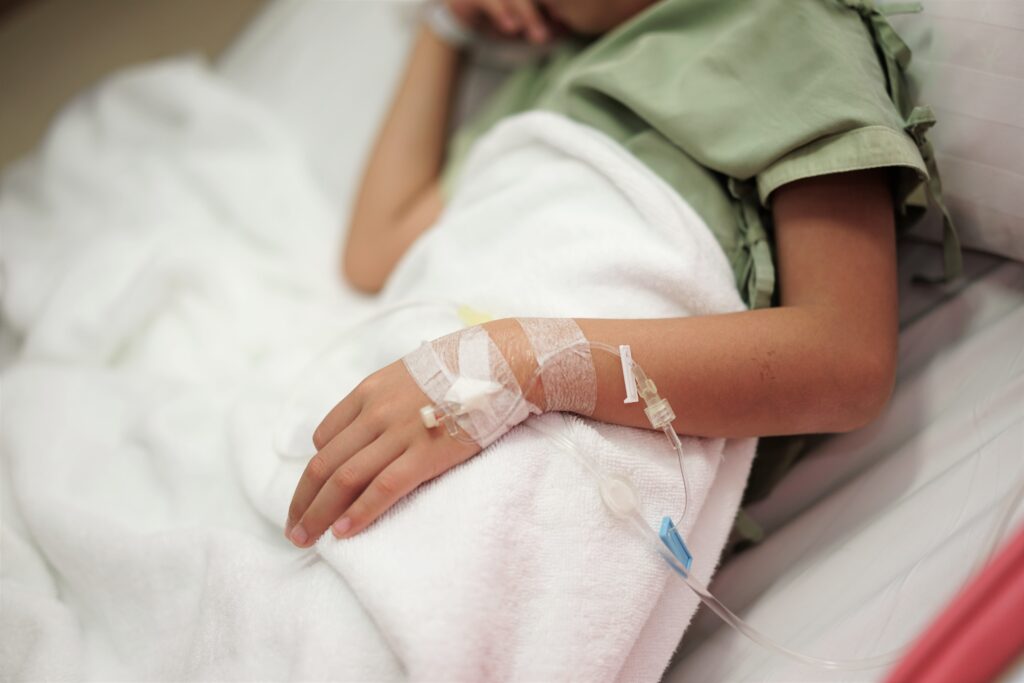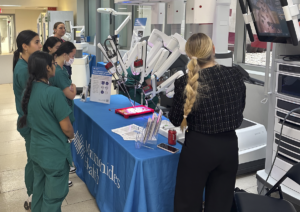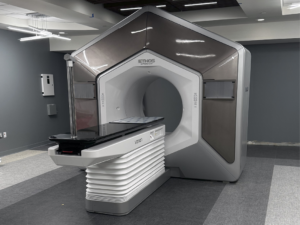The incidence of pediatric cancer and blood disorders are far lower than rates among adults. Still, in the United States, there are roughly 15,000 children and adolescents under age 20 diagnosed with some form of cancer each year* and thousands more living with a blood disorder. Treating these conditions and responding to patient needs can be a complicated process. Fortunately, Maimonides Children’s Hospital is at the leading edge of pediatric cancer care.
The Division of Pediatric Hematology and Oncology takes a multidisciplinary approach to patient care that is rooted in evidence-based research. By working together as a team, providers offer a full range of therapies that can treat both common and rare forms of pediatric cancer. Still, it’s the patient population that makes oncology care at Maimonides so unique.
“Our patients are a big part of what makes our oncology program so special,” says Ludovico Guarini, MD, Chief of Pediatric Hematology and Oncology. “Brooklyn is an immigrant community. We see patients from all over the world and provide care through language and cultural differences. And our providers always come together to deliver the highest quality care possible.”
Advanced, Comprehensive Cancer Expertise
Maimonides offers a comprehensive suite of services that includes basic testing, sophisticated lab procedures, experimental protocols, and nuanced pain management. Dr. Guarini says they are well equipped to deliver personalized care based on the patient’s diagnosis.
“We treat all forms of pediatric cancer. Most commonly, we see blood cancers like lymphomas or leukemias. We also take care of children with solid tumors with the help of a very strong Pediatric Surgery program,” he says. “Furthermore, in collaboration with our expert pediatric urology program, we treat patients with germ cell tumors that affect the reproductive organs and brain tumors alongside our pediatric neurosurgery program.”
The cancer team partners closely with other specialists at Maimonides. They work with radiologists to ensure providers receive clear CT, MRI, and PET images. Pathologists use the most sophisticated techniques, like flow cytometry to provide the most accurate, detailed diagnoses. And anesthesiologists work directly with families to provide pain management and sedation during medical procedures like spinal taps.
Patients have access to chemotherapy, infusions and transfusions in an outpatient setting for families’ convenience. Maimonides also offers the most innovative, forward-thinking therapies. For example, patients with acute lymphoblastic leukemia may receive front-line antibody therapy to prevent relapse.
Patients may also receive advanced biological therapy in the Maimonides Infusion Center. Delivering these targeted therapies in the Infusion Center ensures patients don’t need to go to the hospital for care.
Field Leadership Through Clinical Trials
Delivering comprehensive, collaborative clinical care is only part of what makes Maimonides a sought-after destination for pediatric hematology and oncology care. Leading-edge, trailblazing research is another factor. The hospital’s collaboration with the Children’s Oncology Group gives patients access to experimental and innovative treatment protocols and clinical trials.
“For nearly 70 years, this international group has been at the forefront of advancing treatments for pediatric oncology,” Dr. Guarini says. “As the only hospital in Brooklyn to partner with this organization, we’re able to provide state-of-the-art care. This is where the innovation happens. Through our participation, we offer studies, medications and treatments that are at the forefront and cutting edge.”
Overall, the hospital participates in two kinds of clinical trials. The first examines and compares established therapies. The second assesses how new drugs work in a variety of protocols, evaluating their safety and efficacy.
Currently, Maimonides researchers are involved in a trial testing the efficacy of an antibody delivered via infusion therapy. The antibody specifically targets leukemia cells in patients who have experienced a relapse. At this time, three Maimonides patients are participating. Dr. Guarini says the protocol is innovative because nursing staff can teach patients and their families to deliver and manage the treatment at home, reducing the number of hospital visits necessary during their treatment.
A Compassionate, Kid-Friendly Approach
Receiving a cancer diagnosis and undergoing treatment is difficult for any patient. But it can be particularly hard for children and their families. To make the experience easier, the division partners with Maimonides’ Child Life, Creative Arts, and Education Program.
These specialists offer support services many families need during treatment and beyond. In addition to creative activities and therapeutic play, the staff help educate families about their children’s condition and help them navigate hospital procedures.
“The support personnel in our Child Life Services are exceptionally important,” Dr. Guarini says. “As therapists, they are vital because distraction and guidance help the family and the patient.”
This encouraging, patient-centered approach to care goes further. Many patients have socioeconomic needs that can be obstacles to accessing care. To meet those needs, the division also works closely with social workers who can help coordinate transportation or connect families with organizations that can provide financial support.
Ultimately, Dr. Guarini says, the division provides boutique care. The tight-knit cadre of providers know each patient by name, and they follow each child through adolescence into adulthood.
“Every time a patient walks through the door, we know their story,” he says. “There is a tremendous connection between patients and personnel at all levels. Our goal is to offer an intimate care experience for every child and their family.”
Learn more about pediatric cancer care at Maimonides Children’s Hospital or call (718) 283-7500 to make an appointment or referral.
*https://www.cancer.gov/types/childhood-cancers/child-adolescent-cancers-fact-sheet




